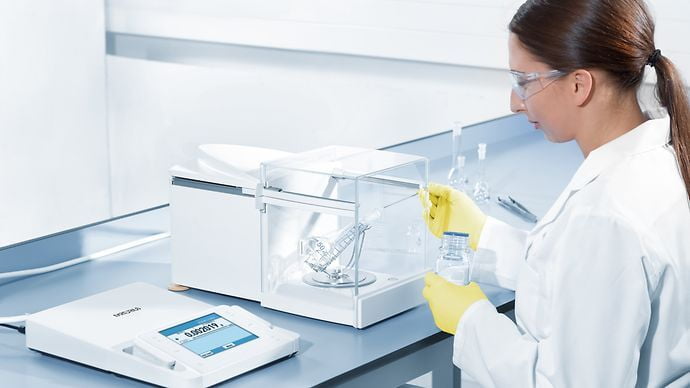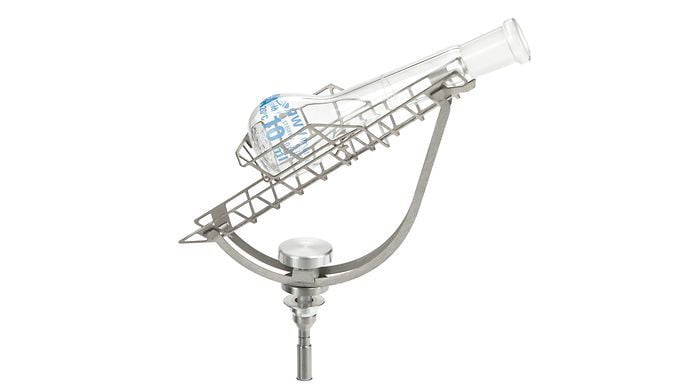Cubis®️ High Capacity Micro Balance
Cubis®️ High Capacity Micro Balance
Weigh the Smallest Quantities Directly into Heavy Containers
The Cubis high-capacity micro balances provide the world’s highest resolution of more than 60 million divisions in micro weighing instruments manufactured in large series.
We offer two full-resolution balances with a weighing capacity of 31 g and 61 g, and a readability of 1 µg, as well as two PolyRange models with weighing capacity of 6 g |31 g and 12 g | 61 g and readability levels of 1 µg | 10 µg.
An additional model, MSA116P, even lets you use container sizes with volumes of up to 250 mL, such as long-necked flasks or HPLC bottles, to directly use these to weigh minimum quantities of only 1.64 mg.
Ease your work during preparing calibration standards as you no longer need to resort to weighing a minimum sample amount on a “normal” micro balance or experience the risk of sample loss when transferring it to a larger vessel.
Forget Inconvenient and Error-Prone Sample Transfer
Forget Inconvenient and Error-Prone Sample Transfer
Have you been weighing your expensive samples in the smallest vessels or on weigh boats or paper in your lab, and then needing to transfer these amounts to larger containers in the next step? Now you can forget about risking inaccuracy and wasting costly material. The new Sartorius high-capacity micro balances offer you an excellent, work-saving solution. They provide a choice of weighing capacities of up to 61 g with a readability of 1 µg and of a capacity of 111 g and a fine range of 12 g with a readability of 2 µg.
No more quantitative transfer is needed, as you can weigh your sample directly into a large, heavy flask appropriate for preparing your reference standards. Moreover, the balances feature an optimal minimum weight capability in compliance with USP Chapter 41. This means you can weigh the smallest quantities, maximizing the use of your costly samples, which may be available only in small amounts.
- Save on purchasing expensive sample quantities as the balance’s optimal USP minimum weight capability reduces the amounts required.
- Reduce costs by eliminating the need for using weigh boats or paper.
- Save an extra step and prevent errors in your results due to sample loss during quantitative transfer.
- Stop worrying about whether you have sufficient weighing capacities, fine ranges and readabilitie
Just think in terms of the volumetric container sizes and minimum weights.
Have you been weighing your expensive samples in the smallest vessels or on weigh boats or paper in your lab, and then needing to transfer these amounts to larger containers in the next step? Now you can forget about risking inaccuracy and wasting costly material. The new Sartorius high-capacity micro balances offer you an excellent, work-saving solution. They provide a choice of weighing capacities of up to 61 g with a readability of 1 µg and of a capacity of 111 g and a fine range of 12 g with a readability of 2 µg.
No more quantitative transfer is needed, as you can weigh your sample directly into a large, heavy flask appropriate for preparing your reference standards. Moreover, the balances feature an optimal minimum weight capability in compliance with USP Chapter 41. This means you can weigh the smallest quantities, maximizing the use of your costly samples, which may be available only in small amounts.
- Save on purchasing expensive sample quantities as the balance’s optimal USP minimum weight capability reduces the amounts required.
- Reduce costs by eliminating the need for using weigh boats or paper.
- Save an extra step and prevent errors in your results due to sample loss during quantitative transfer.
- Stop worrying about whether you have sufficient weighing capacities, fine ranges and readabilitie
Just think in terms of the volumetric container sizes and minimum weights.
Always the Right Flask Position for Optimal Sample Dosing
Always the Right Flask Position for Optimal Sample Dosing
A sample holder just right for every lab container enables you to work accurately and safely. That is why Sartorius has designed an adjustable sample holder YSH02 with “one-size-fits-all” flexibility. It lets you optimally position the flask you use for preparing stock solutions or reference standards so you can conveniently dose even the smallest quantities of a substance accurately.
Whether you use long-necked round-bottom flasks, cylindrical HPLC bottles or test tubes, you can adjust the Sartorius titanium sample holder to the size of your vessel. Easily adjust the angle and position for ergonomic and reliable dosing. The extended space on our large 50 mm diameter weighing pan is ideal for vessels requiring a larger support area to prevent them from tipping over (comes as standard with weighing modules 66S, 66P and 116P).
The Complete Weighing Process under Control – for Optimal Weighing Performance
The Complete Weighing Process under Control – for Optimal Weighing Performance
The larger the container you use, the more it is exposed to environmental influences:
Temperature, buoyancy, air currents, electrostatic effects, etc., all have a considerable impact on the response time and the stability of weight readouts. The following principle also applies in this case: The smaller the sample quantities used, the larger the relative measuring errors become. This also makes handling such micro-quantities all the more difficult.
The new micro balances have an optional climate sensor module implemented in the draft shield, enabling you to have the temperature, humidity and barometric pressure under control at all times.
In our wide range of accessories, we also offer an ionizer to reduce the effects of static electricity.
YAPP16 Dosing Q-App for Pharma Applications
YAPP16 Dosing Q-App for Pharma Applications
Standards of defined concentrations are used to determine the concentration of unknown samples. Such standards need to be prepared accurately in order to minimize errors during analysis of unknown samples. However, it is next to impossible to weigh a solid sample so precisely that you can use a predefined volume of solvent. With the new YAPP16 Dosing Q-App software installed, your Cubis® MSA balance converts into an automated system for gravimetric monitoring of all measured values.
The Dosing Q-App automatically adjusts the volume of the solvent to the weight of your compound and determines the verified final concentration of your standard solution based on the weight of solvent actually added. Time-consuming and error-prone manual preparation of standards using volumetric determination is now a thing of the past.
For more information on YAPP16, visit our Cubis® App Center
Choose Your Weighing Balance based on your application :
Sartorius Micro balance accuracy are not compromised , Regardless of your choice of software options or user interface. we offer you high level precision, achieving MinWeight of 0.82 mg according to USP Chap. 41 Requirement.
Sartorius Micro balance accuracy are not compromised , Regardless of your choice of software options or user interface. we offer you high level precision, achieving MinWeight of 0.82 mg according to USP Chap. 41 Requirement.
Modules Available and Specifications
| Weighing Module | 66S | 66P | 36S | 36P | 116P |
| Max Capacity | g | 61 | 12|61 | 31 | 6|31 | 12|111 |
| Readability | µg | 1 | 1|10 | 1 | 1|10 | 2|10 |
| Repeatability | ±µg | 4/1,5 (50g/2g) | 10/2 (50g/2g) | 2/1,5 (20g/1g) | 8/1,5 (20g/1g) | 10/4 (100g/5g) |
| Optimal Minimum Weight | mg | 0,82 | 0,82 | 0,82 | 0,82 | 1,64 |
| Typical Stabilization Time | s | 3.5 | 3.5 | 3.5 | 3.5 | 3.5 |
| Typical Response | s | 10 | 10 | 10 | 10 | 10 |
| Off-center Loading | ±µg | 20 (20g) | 20 (20g) | 15 (20g) | 15 (20g) | 30 (20g) |
| Linearity | ±µg | 20 | 20 | 10 | 10 | 20 |
All models feature
- An electronic leveling bubble displayed for fast and easy manual leveling guided by software
- DH draft shield: The DH draft shield is an automatic, motorized draft shield with a learning capability and a choice of operation either by an ergonomic, palm-activated key or by the touch-free infrared sensor




